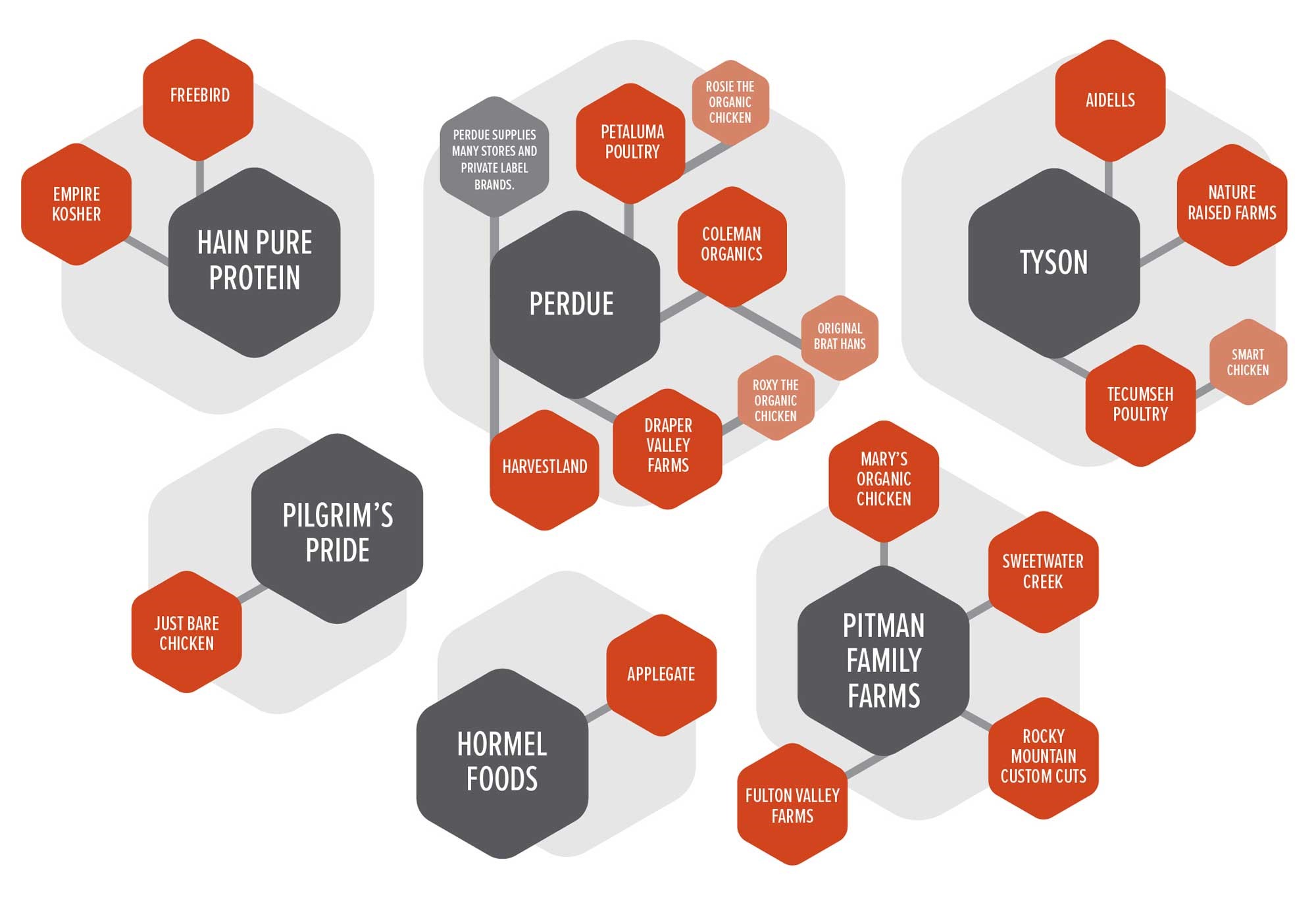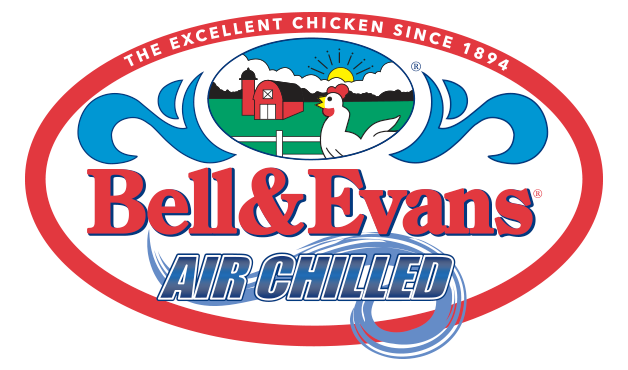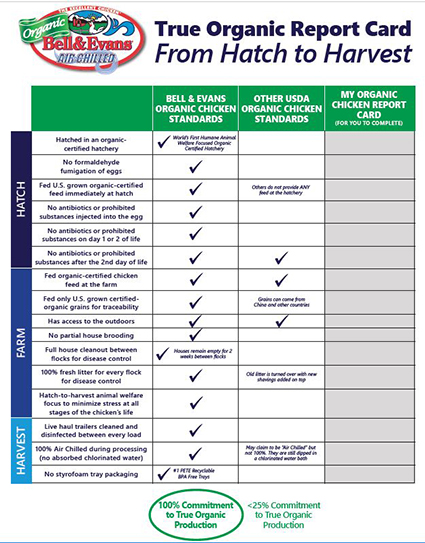Do you know what “organic” chicken means?
I find that most people –
- Buy organic chicken and think they know the differences (and are likely wrong), OR
- Buy organic chicken and hope it’s better for them without knowing the differences, OR
- Don’t buy organic chicken because they think “organic” is all marketing hype.
When the organic movement first began 20+ years ago, I didn’t pay much attention. I was too busy becoming the first U.S. chicken producer to remove antibiotics and establishing the first “all-natural chicken” label. These were goals of mine since I was a kid and big moves within the chicken industry. That was in 1998. At that time, I was ridiculed by peers and no one believed I’d be successful and make money raising chickens my way.
Fast forward 10 years to 2008, and Bell & Evans was ready to launch its certified-organic chicken. What I realized about “organic” when I slowed down and really explored it is that the ideals align very closely with mine. Our intent has always been to raise chickens the right way and produce the most natural, best tasting chicken on the market.
It’s no wonder that Bell & Evans is really good at organic chicken given we had the right intentions all along. Recently, The Cornucopia Institute (a national, nonprofit watchdog group of the organic industry) released a report about “industrial” organic, and it’s quite telling. Bell & Evans is the only national organic producer on its scorecard to earn an “Excellent” 4-star rating while other familiar organic brands are listed as 1 star. Our organic program is successful because of our 100% rule. We were never a commodity business, so we produce 100% of our chicken with premium standards. We offer Raised Without Antibiotics chicken (about 55% of our business) and, one step higher, organic chicken (the remaining 45% of our business). That’s it. The programs are nearly identical, which allows us to easily adjust our organic output because we have all our necessary organic standards in place throughout our full process. Now think about the commodity producers with different standards for different brands they own. How committed to organic can the big guys really be when their organic business is less than 5% of their overall business? The Cornucopia Institute created an infographic, Who Owns Organic Poultry?, to illustrate this point.

Image Source: The Cornucopia Institute (2020)
Unfortunately, when commodity producers wanted an “all-natural chicken” label, they cut corners to get it and the label got watered down. Today, nearly all chicken you purchase is labeled all natural. We see organic chicken heading down the same path, so it’s important to understand what organic chicken means – or should mean.
Do you think an organic grain starts from an organic seed? What about an organic chicken – does it come from an organic egg? You would think so, but the answer to both of these questions is no. Shocked? We agree. Organic standards should equal or exceed the perceived value by customers. Bell & Evans has always and will continue to challenge the industry to do better, and these are two examples of initiatives we’re working on.
To better understand Bell & Evans Organic Chicken Standards vs. National Organic Standards for chicken (what other organic producers are required to follow), here is a checklist. No matter what organic chicken you purchase, there is some added value. Bell & Evans over delivers because we believe it’s the right thing to do. Use the report card section to grade the organic chicken you purchase.



Are your chickens pasture raised? Do you have the humane certification?
Our organic chickens have access to pasture when the weather is good. Bell & Evans Humane Animal Welfare Standards far exceed “paid for” third party requirements since they are not inclusive of the chickens’ entire lifecycle. Take a look at this side-by-side comparison of the programs: https://www.bellandevans.com/wp-content/uploads/Humane_Anim_Welf_Std_Website7_27.pdf
Thank you so much for this education on organic chicken. I love being armed with knowledge about the foods that we eat and feed our children. You have opened my eyes and I can not unsee what I have seen. Bell & Evans is a life changer!
Thank you so much, Kristine!
Bell and Evans chicken is the only kind I will use to make all our dog’s food. Our young rescue dog loves her food and she is healthy, energetic and happy. Her food has Bell and Evans boneless, skinless breasts and thighs, organic vegetables (carrots, sweet potatoes, butternut squash, spinach and peas), organic hulled barley and groats, fresh ground flaxseed and dried organic cranberries. My vegan husband thinks our puppy will have a very long, healthy life because of the good food I make for her and the many miles of trails and beaches they hike every day.
Thank you for the humane treatment of your chickens. We had a small flock of heirloom chickens for eggs. Our “girls” were cared for and lived in a “chickie mansion” and laid eggs for us until they passed away of old age (12-14 years), so we really appreciate the way you care for your chicks.
Thank you for providing a great product we can trust.
Thank you, Linda! Our Digital Marketing Manager wants to know if you can adopt her too. 😉
😂🤗 someone might imagine she is spoiled, but the moment anyone meets her the first comment is how sweet she is. I only wish that over the years I had fed our other dogs Bell and Evans chicken and vegetables cooked this way. Although they lived long lives I really believe they would have had much healthier lives.
Hello: Last month, USDA’s Food Safety and Inspection Service (FSIS) announced its approval of a petition filed by the National Chicken Council to permit chicken that is infected with the avian disease Leukosis to be fit for human consumption. Does Bell & Evans permit chicken with Leukosis to be processed and sold?
Hi LT, Thank you for contacting Bell & Evans. To address your question regarding changes to USDA poultry regulations and leukosis:
At this time, Bell & Evans is not changing our policy/process and will continue to condemn birds showing signs of leukosis. Even as this disease does not occur often on our farms, food safety and quality are extremely important. We will continue to go above and beyond to offer the best product possible to our customers.
So you say you feed organic grains grown in the US; sounds good except I am wondering if these grains are none GMO?
Hi Doris, all organic grains are non-GMO.
What exactly is the difference in the feed of your Organic and Non-Organic chicken. What makes your blue label chicken not organic is my question,
Hi Leslie, our Organic Chickens are fed Organic feed. Our Non-organic chickens are fed non-organic feed. Same basic ingredients, just organic feed vs. non-organic feed.
Thank you for caring for a high quality of life of your birds their entire lives! I’m vegetarian, but have regularly purchased chicken for my dogs, and occasionally for for my family (holiday). I have two questions.
1. Do your non-organic chickens, packaged in the blue labels, have the identical standards in all other ways except for organic feed, or do they not all have access to the outdoors, or meet the same standards as the organic chickens in other regards?
2. When your chicks are separated, male and female, do you raise your egg-laying hens from your own female chicks? And do both the boy chicks and some become the roosters and meat that people eat? Thanks so much.
Hi Laura, Good questions! Here are some answers:
1. Our non-organic (or Raised without Antibiotics) chickens do have almost identical standards to the organic chickens. ALL of our chicks get Organic feed at our Hatchery. Then when they go to the farms, only the organic chickens have continue on organic feed and have access to the outdoors. However all of the barns are built to meet organic standards, and have windows for lots of natural light. Though feed for non-organic chickens is not organic, it is high quality feed comprised of expeller pressed soybeans, corn and essential oils to keep chickens happy and healthy.
2. We get our breeder hens and roosters from our genetic supplier. Those breeder hens lay the eggs that we hatch. From our Hatchery, all chicks go to broiler farms. We do not separate our chicks. Both male and female chicks to go the broiler houses.